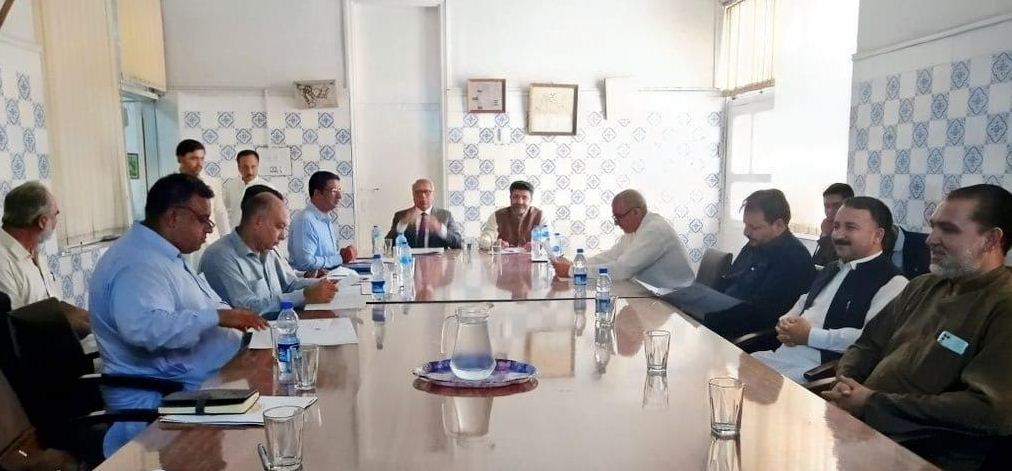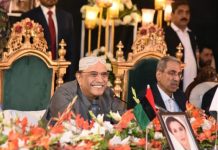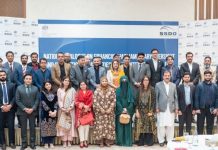DNA
ISLAMABAD, JUL 9 – An In-House Discussion on the topic “Understanding the Legal Framework and Regulatory Regimes of Central Asia” was jointly organized by Area Study Center (Russia, China, and Central Asia), University of Peshawar, Peshawar and Center for Global& Strategic Studies, Islamabad at Peshawar to discuss the regional trade and investment legal framework.
This in-house discussion focused on examining the legal challenges, modalities, need for improvement in existing laws, and exploring new avenues of cooperation under revised legal framework.It was discussed that laws and regulatory Regimes of Central Asia will be studied by scholars and subject experts to get a better understanding and overview of their comparability with laws in Pakistan. Comparative analysis of these regulatory Regimes will also be ensured.
Mian Abdul Rauf Former Advocate-General Islamabad & Prosecutor-General of Pakistan under the Protection of Pakistan Act and Member Law and Justice Commission of Pakistanwas the Chief Guest at the occasion. He stated that modern day developments further exemplify the importance of effective legal frameworks in Pakistan and Central Asia. Highlighting the significance of the legal frameworks, he stated that, at present, the legal frameworks of states within Central Asia are variable. With the passage of time, uniformity must be deemed necessary in light of trade and commerce developments within the region. It is further imperative that inter-state commerce and trade be regulated by a coherent and comprehensive legal framework for the region in order to sustain economic development in the region. He stated that learning from the past and analyzing the future is important. He also stated that peace in Afghanistan is imperative which will open new gateways for Central Asia, Russia and other regional countries. Establishment of the Regional Anti-Terrorist Structure (RATs) of SCO is a step towards integration with elimination of radicalization.
Prof. Dr. Shabir Ahmed, Director, Area Study Center, (Russia, China, and Central Asia), University of Peshawarwhile addressing the forum said that the Centre’s scholars have been conducting research on Alternative Dispute Resolutions (ADRs), refugees laws and Pak-Afghan Trade Agreement. However, it was emphasized to study the trade and investment laws of the CARs to find out the discrepancies with Pakistan’s legal framework and accordingly address these issues. It is important that soft component of the regional integration i.e. harmonization and coordination of laws and regulations has been developed within the region. It was suggested that national human resource shall be pooled to help in this regard. We must focus and study on Shanghai Cooperation Organization (SCO), Belt and Road Initiative (BRI) and China-Pakistan Economic Corridor (CPEC) and must analyze how Pakistan can benefit from these projects.
Mr. Khalid Taimur Akram, Executive Director, Centre for Global& Strategic Studies, Islamabad explained in detail the evolving regional dynamics. He highlighted the importance of academic linkages in the developing scenario and the significance of international projection of Pakistan’s academia and scholars. He stated that the laws of Pakistan and Central Asia are different, therefore, a detailed study must be done to ensure enhanced trade and commerce activities for the better interestof the region. Mr. Akram stated that we must utilize the human resource of Pakistan for laws and regulatory regimes.
Prof. Inayatullah Khan, Dean, Law College, University of Peshawardiscussed the compatibility of laws between Pakistan and Eurasia and provided a comparative study on the trade laws of Pakistan and Central Asia. He suggested to invest in the human resource of the academic sector of Pakistan, so they may study the trade laws and regulatory regimes of Central Asia and construct a comparative analysis of these laws with Pakistan. He was of the view that we should work towards integrating our cultures and laws with the Central Asian Region.
The In-house discussion was attended by approximately 30 participants including the law experts, Faculty Members and PhD scholars ofLaw departments from various universities of Peshawar.

















